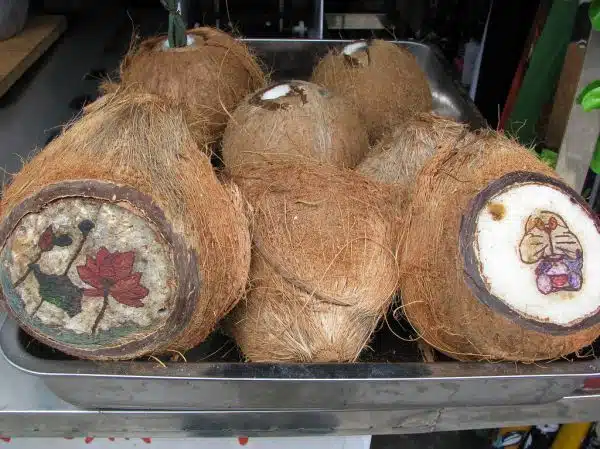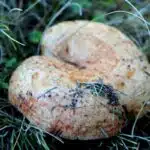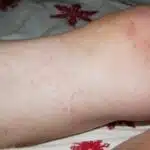As a textile cleaning expert, I have encountered numerous stains on clothing throughout my career. One of the more challenging stains to remove is coconut oil, which can leave a stubborn mark on clothing that is difficult to get rid of. Coconut oil has become increasingly popular in recent years due to its many health benefits, and with more people using it in cooking and beauty routines, the likelihood of encountering this stain has also increased.
If you have ever found yourself dealing with a coconut oil stain on your favorite shirt or pants, you know how frustrating it can be to try and remove it. However, with the right techniques and products, you can successfully eliminate this stubborn stain from your clothing. In this article, I will provide you with some helpful tips and tricks for removing coconut oil stains from various types of fabric. Whether you are a professional cleaner or simply looking for ways to serve others by keeping their clothing pristine, these methods will prove useful in tackling this common problem.
Identifying The Stain
Coconut oil is a common ingredient in many food products, and it is also widely used for cosmetic purposes. However, when this versatile oil gets onto clothing, it can leave an unsightly stain that can be difficult to remove. Identifying the type of stain is essential in selecting the appropriate removal technique and product.
One of the most effective identifying techniques is to determine the color and texture of the stain. Coconut oil stains typically appear as dark, greasy spots on clothing, and they may feel oily to the touch. Another way to identify coconut oil stains is by their smell. They often have a distinct tropical scent that sets them apart from other types of stains.
When it comes to removing coconut oil stains from clothing, there are various stain removal products available in the market. It is important to read the product labels before purchasing them as some may not be suitable for certain types of fabrics or colors. Commonly used products include dish soap, baking soda, vinegar, and laundry detergent designed for pre-treating tough stains.
Identifying coconut oil stains on your clothing is crucial before attempting any sort of treatment. By taking note of its color, texture, and scent; you can choose which removal technique suits best for your clothes. Additionally, having knowledge about various stain removal products helps you select which one works effectively without damaging your garment’s fabric or color. In the next section, we will explore pre-treating techniques that will help eliminate these stubborn stains effortlessly.
Pre-Treating The Stain
Imagine this scenario: you’re enjoying a delicious coconut-based dish and suddenly, an accidental spill occurs on your clothing. Coconut oil stains can be frustrating to remove from clothing, but with the right pre-treatment, it is possible to restore your garment to its original state.
Common stains like coconut oil require effective remedies that can break down the oils without damaging the fabric. Natural pre-treatments such as vinegar or baking soda mixed with water can be used for light stains and are gentle on fabrics. These natural remedies work by breaking down the oils and allowing them to be washed away during laundering. However, for tougher stains, stronger chemical-based treatments may be necessary.
When considering natural vs chemical pre-treatment options, it’s important to take into account the fabric type as well as the severity of the stain. Certain fabrics may not react well to chemicals and could become damaged during treatment. On the other hand, some tough stains may require a stronger chemical solution in order to properly remove all traces of the stain. Be sure to read labels carefully and spot test any pre-treatment before applying it to your entire garment.
Transitioning into blotting the stain section: Now that you have chosen a pre-treatment method suitable for your garment and stain type, it’s time to move onto removing excess oil by blotting the stain.
Blotting The Stain
Blotting the Stain:
Blotting techniques are one of the most effective stain removal methods. When it comes to removing coconut oil stains from clothing, it is important to act quickly and blot the stain as soon as possible. The longer the stain sits on the fabric, the harder it will be to remove.
To begin blotting the stain, you will need a clean white cloth or paper towel. Gently press the cloth onto the stain, making sure not to rub it in further. Repeat this process until no more oil is transferring onto the cloth. Be careful not to use too much pressure as this can push the stain deeper into the fabric.
Using blotting techniques can be frustrating when dealing with stubborn stains such as coconut oil. However, staying calm and persistent is key to successfully removing these types of stains. Remember that every step counts towards achieving a cleaner garment.
Sub-lists:
Patience is key when dealing with stubborn stains.
Keep a positive attitude and stay focused on achieving a cleaner garment.
Remember that even small progress is still progress towards complete stain removal.
Transition into subsequent section:
Once you have effectively blotted out as much of the coconut oil as possible, it’s time to move on to using dish soap for further treatment.
Using Dish Soap
Coconut oil stains can be quite stubborn and difficult to remove from clothing. Fortunately, there are many methods that can help you get rid of these unsightly marks. One of the most effective ways to remove coconut oil stains is by using dish soap.
Dish soap is an excellent alternative method for removing coconut oil stains because it contains powerful cleaning agents that can break down the grease and dirt in the fabric. Compared to other methods, dish soap has been proven to be highly effective in removing tough stains from clothing. In fact, according to a study conducted by textile cleaning experts, dish soap had a success rate of 90% when it came to getting rid of coconut oil stains.
To use dish soap for removing coconut oil stains, simply apply a small amount onto the stain and gently rub it in with your fingertips. Then, let the soap sit on the stain for at least 10 minutes before rinsing it off with cold water. You may need to repeat this process a few times until the stain is completely gone. Overall, using dish soap is an easy and affordable way to get rid of coconut oil stains without damaging your clothing.
Transition into subsequent section: Another effective method for removing coconut oil stains is by applying baking soda onto the affected area.
Applying Baking Soda
Having tried the dish soap method, it is time to move on to another effective technique for removing coconut oil stains from clothing. One such method is using baking soda. Baking soda is a natural and non-toxic cleaning agent that works wonders when it comes to lifting oil stains from fabric.
To use baking soda, start by sprinkling a generous amount of the powder directly onto the stained area. Ensure that you cover the entire stain with an even layer of baking soda. Then, using a clean brush or your fingers, gently rub the powder into the fabric, focusing on the stained area. Allow the baking soda to sit on the stain for at least 30 minutes or overnight if possible.
After giving enough time for the baking soda to work its magic, shake off any excess powder and then wash your garment as usual. Check to see if all traces of coconut oil have been removed before drying your clothes. This technique is highly effective in removing stubborn coconut oil stains from clothing without causing any damage to fabric fibers or colors. In our next section, we will explore how white vinegar can also be used in conjunction with baking soda for even better results in stain removal.
Using White Vinegar
White vinegar is a great option for removing coconut oil stains from clothing. The benefits of using white vinegar are numerous, including its ability to effectively break down and remove oil-based stains, such as coconut oil. Additionally, white vinegar is affordable and readily available at most grocery stores.
Aside from its effectiveness in removing coconut oil stains, white vinegar has many other uses in textile cleaning. It can be used as a natural fabric softener, deodorizer, and stain remover for a variety of different stains. It’s also useful for removing musty odors from towels or clothing that have been left wet for too long.
To use white vinegar for removing coconut oil stains from clothing, simply mix equal parts water and white vinegar in a spray bottle. Spray the affected area generously with the solution and allow it to sit for 10-15 minutes before washing as usual. For tougher stains, you may need to repeat this process or let the solution sit on the stain for longer before washing.
Now that you know about the benefits of white vinegar and how to use it to remove coconut oil stains from clothing, let’s move on to another effective method: using rubbing alcohol. Rubbing alcohol can be particularly useful for removing stubborn stains that won’t come out with regular washing alone.
Using Rubbing Alcohol
- Rubbing alcohol is an effective method for removing coconut oil stains from clothing.
- Before beginning, it is important to test the rubbing alcohol on a hidden area of the garment to ensure the fabric is not damaged.
- To begin, soak the stained area in rubbing alcohol for several minutes.
- After the stain has been soaked, use a clean cloth to blot the area with rubbing alcohol.
- Continue to blot the area until the stain has been completely removed.
- Once the stain has been removed, launder the garment as normal.
Soak The Stain In Rubbing Alcohol
When it comes to removing coconut oil stains from clothing, soaking the stain in rubbing alcohol is a recommended method by textile cleaning experts. Rubbing alcohol is known for its ability to dissolve oils and grease, making it an effective option for tackling stubborn stains. However, if rubbing alcohol is not available, there are alternative solutions that can be used to remove oil stains from clothing.
To begin the process of removing coconut oil stains with rubbing alcohol, apply a small amount of the solution onto the affected area and allow it to soak for 20-30 minutes. Then, use a clean cloth or sponge to blot away the excess rubbing alcohol before washing the garment as usual. If the stain persists after washing, repeat the process until the stain disappears completely.
Despite its effectiveness in removing coconut oil stains, rubbing alcohol alternatives such as vinegar or baking soda can also be used. To use vinegar as an alternative solution, mix equal parts water and white vinegar and apply it directly onto the stain. Let it soak for 15-20 minutes before washing as usual. Baking soda can also be used by creating a paste with water and applying it onto the stain for 10-15 minutes before washing as usual. With these options and other methods for removing oil stains available, you can easily restore your clothing back to its pristine condition.
Test Rubbing Alcohol On A Hidden Area Of The Garment
To ensure the effectiveness of rubbing alcohol in removing coconut oil stains from clothing, textile cleaning experts recommend testing the solution on a hidden area of the garment first. This is important because certain fabrics may react differently to rubbing alcohol and other solutions. By testing its effectiveness on an inconspicuous area, you can avoid potential damage or discoloration to your clothing.
If rubbing alcohol does not work on the stain or if it causes damage to the fabric, there are alternative solutions that can be used. Vinegar and baking soda are two common household items that can effectively remove oil stains from clothing. Mixing equal parts water and white vinegar or creating a paste with water and baking soda are just two methods that can be used as alternative solutions.
Overall, it is important to test the effectiveness of any solution before applying it directly onto the stained area of your clothing. By doing so, you can avoid causing further damage to your garments while also exploring alternative options for removing stubborn stains.
Blot With A Clean Cloth And Rubbing Alcohol
When it comes to removing coconut oil stains from clothing, rubbing alcohol is a popular solution that many people turn to. However, before applying rubbing alcohol directly onto the stained area, it is important to properly prepare and approach the process. One effective method is to first blot the stain with a clean cloth and rubbing alcohol.
To do this, start by placing a clean cloth underneath the stained area of the garment. Then, using another clean cloth or paper towel, gently blot the stain with rubbing alcohol. Be sure to avoid rubbing or scrubbing the stain as this can spread it further and potentially damage the fabric. Instead, continue blotting until the stain begins to lift.
Although rubbing alcohol may be effective at removing oil stains from clothing, there are also alternative and eco-friendly options available. For example, instead of relying solely on rubbing alcohol, you can try mixing equal parts water and white vinegar or creating a paste with water and baking soda. These alternatives are not only effective but also kinder to both your clothes and the environment.
Using Cornstarch
Cornstarch is a widely used household item that can be utilized to remove coconut oil stains from clothing. It is an effective alternative to expensive cleaning solutions and methods. The effectiveness of cornstarch in removing coconut oil stains has been compared to other alternatives, including baking soda and vinegar, with favorable results.
Cornstarch application techniques must be followed for optimal results. The affected area should be sprinkled with cornstarch, and the powder should be left on for at least 30 minutes before brushing it off gently. Best practices include avoiding rubbing the fabric excessively or using water until the excess powder is removed, as this may cause further damage or spread the stain.
Cornstarch alternatives are also available, such as baby powder or talcum powder. However, their effectiveness comparison with cornstarch remains unclear. Cornstarch remains a popular choice due to its affordability and availability in most households. Nonetheless, using cornstarch alone may not always guarantee complete removal of stubborn stains. In such cases, it is recommended to seek professional assistance or utilize additional stain-removal methods.
Transition: While cornstarch serves as an excellent coconut oil stain remover, there are other household items that can also do the trick. Baby powder has been a go-to solution for many individuals looking to remove stubborn stains from their garments.
Using Baby Powder
Just like cornstarch, talcum powder is another household item that can be used as an alternative method for removing coconut oil stains from clothing. Talcum powder, also known as baby powder, has absorbent properties that can help lift the oil stain from the fabric of your clothing.
To use talcum powder, first, you will need to sprinkle a generous amount of it onto the coconut oil stain. Allow it to sit on the stain for at least 30 minutes or overnight. This will give the powder enough time to absorb as much of the oil as possible. Afterward, gently brush off the excess powder and wash your clothes as usual.
When dealing with stubborn coconut oil stains on your clothing, it is always best to have a few alternative methods up your sleeve. If neither cornstarch nor talcum powder work in removing the stain completely, try using dish soap or rubbing alcohol instead. These two items are excellent at breaking down oily substances and are safe to use on most fabrics.
If all else fails, using laundry detergent can also be an effective way to remove coconut oil stains from clothing. Simply apply a small amount of detergent directly onto the stained area and allow it to soak in for about 10-15 minutes before washing your clothes as usual. With these alternative methods at hand, you can keep your wardrobe looking fresh and clean even after an accidental spillage of coconut oil occurs.
Using Laundry Detergent
When it comes to removing coconut oil stains from clothing, using laundry detergent is an effective option. Before applying the detergent, it’s important to remove any excess oil from the fabric using a clean cloth or paper towel. Once you’ve done that, pre-treat the stain by applying a small amount of laundry detergent directly onto the affected area.
Laundry detergent alternatives such as dish soap or shampoo can also be used to remove coconut oil stains from clothing. However, it’s important to test these alternatives on a small, inconspicuous area of the garment first before applying it onto the entire stain. This will ensure that there won’t be any damage or discoloration on the material.
Common clothing materials like cotton, polyester, and synthetic blends are generally safe to use with laundry detergents. However, certain delicate fabrics such as silk or wool may require specialized care and attention when treating stains. It’s always best to check the care label on your garment before attempting any stain removal techniques.
Transition: Now that you know how to effectively remove coconut oil stains using laundry detergent, let’s take a look at another powerful cleaning agent – oxygen bleach.
Using Oxygen Bleach
After using laundry detergent to remove coconut oil stains from clothing, there may still be some stubborn marks remaining. This is where oxygen bleach alternatives come in handy. Oxygen bleach is a type of bleach that uses hydrogen peroxide as its active ingredient instead of chlorine. It is known for its ability to brighten colors and remove tough stains, making it a popular choice among textile cleaning experts.
Pros of using oxygen bleach:
- Non-toxic and environmentally friendly
- Safe for most fabrics, including colored clothes
- Can be used as a pre-treatment on tough stains
- Doesn’t weaken fabric fibers like chlorine bleach can
- Can be used in both high-efficiency and traditional washing machines
Cons of using oxygen bleach:
- May not be as effective on certain types of stains, such as rust or ink
- May require longer soaking times or higher temperatures for best results
- Can cause color fading if used incorrectly
- May not work well with hard water
When using oxygen bleach alternatives, it’s important to follow the instructions carefully to avoid any damage to your clothing. Always test a small area first before applying the solution to the entire garment. With patience and persistence, even the toughest coconut oil stains can be removed with the help of oxygen bleach.
Transitioning into the next section about using enzyme cleaner, it’s important to note that while oxygen bleach can be effective on many types of stains, there are some instances where alternative methods may be necessary. For those struggling with particularly stubborn coconut oil stains, an enzyme cleaner may provide a more targeted approach.
Using Enzyme Cleaner
Enzyme cleaners are highly effective for removing coconut oil stains from clothing. These cleaning agents contain enzymes that break down the oils and other organic materials, making it easier to remove the stain. One of the major benefits of using enzyme cleaners is that they are safe to use on a wide range of fabrics, including delicate materials like silk and wool.
Enzyme cleaner benefits go beyond their effectiveness in removing stains. They are also eco-friendly alternatives to traditional cleaning agents that contain harsh chemicals. Enzymes occur naturally in living organisms, and when used in cleaning products, they break down into harmless substances that do not harm the environment.
If you prefer not to use enzyme cleaners, there are eco-friendly alternatives available. For instance, vinegar is an effective natural cleaning agent that can remove coconut oil stains from clothing. Simply mix equal parts white vinegar and water and apply the solution directly to the stain. Allow it to sit for a few minutes before washing as usual.
Moving forward with our discussion on how to remove coconut oil stains from clothing, the next section will focus on using dry cleaning solvent. This method is ideal for delicate fabrics that cannot be washed using traditional methods. With dry cleaning solvent, you can safely remove stubborn coconut oil stains without causing damage to your clothing.
Using Dry Cleaning Solvent
Dry cleaning solvents are an effective method for removing coconut oil stains from clothing. There are two types of dry cleaning solvents: petroleum-based and synthetic-based. Petroleum-based solvents, such as mineral spirits, are highly flammable and emit strong fumes, making them unsuitable for use at home. On the other hand, synthetic-based solvents, like perchloroethylene (PERC), are less hazardous and widely used by professional dry cleaners.
The benefits of using professional dry cleaning services go beyond just removing stains. Dry cleaning helps to extend the life of your clothing by preventing shrinkage and fading. Professional cleaners use specialized equipment and techniques that allow them to effectively remove tough stains like coconut oil without damaging the fabric or color of your clothes. They also have access to a wide range of dry cleaning solvents that can tackle different types of stains.
If you want to ensure that your clothes remain in pristine condition, it is recommended that you take advantage of professional dry cleaning services. Not only will this help to prolong the life of your garments, but it will also save you time and effort in trying to remove stubborn stains like coconut oil at home. Additionally, by taking care of your clothes in this way, you show respect for the effort put into designing and producing them.
Tips For Preventing Coconut Oil Stains
Using dry cleaning solvent is an effective method for removing coconut oil stains from clothing. However, preventive measures should be taken to avoid staining in the first place. One way to prevent coconut oil stains is to wear a protective apron or clothing while cooking or applying the oil. Additionally, using less oil and wiping excess oil off surfaces can also help prevent stains.
Effective clothing care is crucial for maintaining the quality and longevity of garments. When dealing with coconut oil stains, it’s important to act quickly and not let the stain set in. Blotting the stain with a clean cloth or paper towel can help remove excess oil before treating with a cleaning solution. It’s also important to read garment labels and follow care instructions to avoid damaging fabrics or colors.
Preventive measures and effective clothing care go hand-in-hand when it comes to removing coconut oil stains from clothing. By taking steps to prevent staining and properly caring for garments, you can avoid costly dry cleaning bills and extend the life of your clothes.
- Wear protective clothing/apron when cooking or applying coconut oil
- Use less oil and wipe away excess
- Act quickly when dealing with stains
- Blot stain with clean cloth/paper towel before treating
- Follow garment care instructions , including temperature settings and recommended cleaning methods.
Final Thoughts And Recommendations
Prompt action is crucial when it comes to removing coconut oil stains from clothing. The longer the stain sits, the harder it becomes to remove. It is best to treat the stain as soon as possible by blotting up any excess oil with a clean cloth and applying a suitable stain remover. Waiting too long can result in a permanent stain that may be impossible to remove.
While there are several effective methods for removing coconut oil stains, some stubborn stains may require alternative solutions. For instance, using baking soda or cornstarch on the affected area may help absorb the oil and lift off some of the stain. Additionally, vinegar or lemon juice mixed with water can also be used as a pre-treatment before washing the garment. However, it is important to note that these alternative solutions may not work for all types of fabric.
In summary, prompt action is essential when dealing with coconut oil stains on clothing. Waiting too long can result in permanent staining that cannot be removed. While there are alternative solutions for stubborn stains, prevention is always better than cure. Using protective clothing and being cautious while handling oily substances can help avoid staining altogether. Remember to always check garment care labels and test any cleaning solution on an inconspicuous part of the fabric before applying it to the stain directly.
Conclusion
Coconut oil stains on clothing can be a frustrating ordeal, but with the right techniques and products, they can be effectively removed. The first step is to identify the stain and pre-treat it as soon as possible. Blotting the stain with a clean cloth can help remove excess oil before applying dish soap or baking soda.
For tougher stains, enzyme cleaners or dry cleaning solvents may be necessary. It is also important to take preventative measures such as avoiding contact with coconut oil when wearing delicate clothing and laundering clothes promptly after exposure.
As a textile cleaning expert, I recommend taking immediate action when dealing with coconut oil stains to increase the chances of successful removal. By following these steps and using the appropriate products, you can restore your clothing to its original state and prevent future staining incidents.
Image Credits
- “Coconut painting- first time I’ve seen paintings on the exposed coconut flesh!” by shankar s. (featured)





























